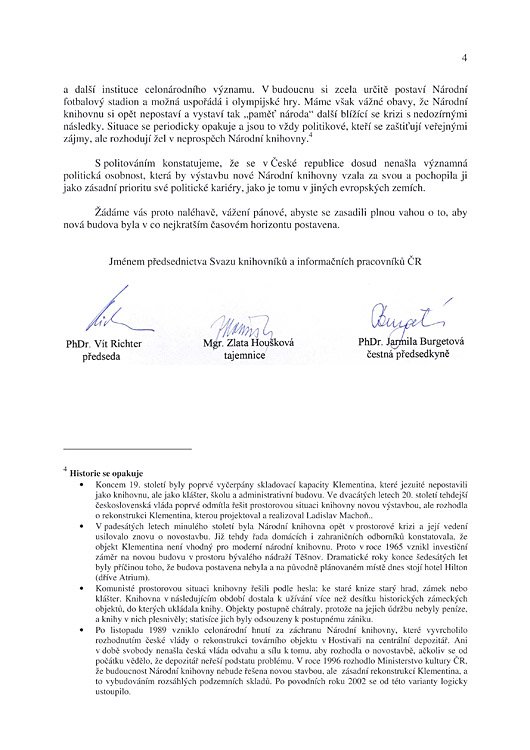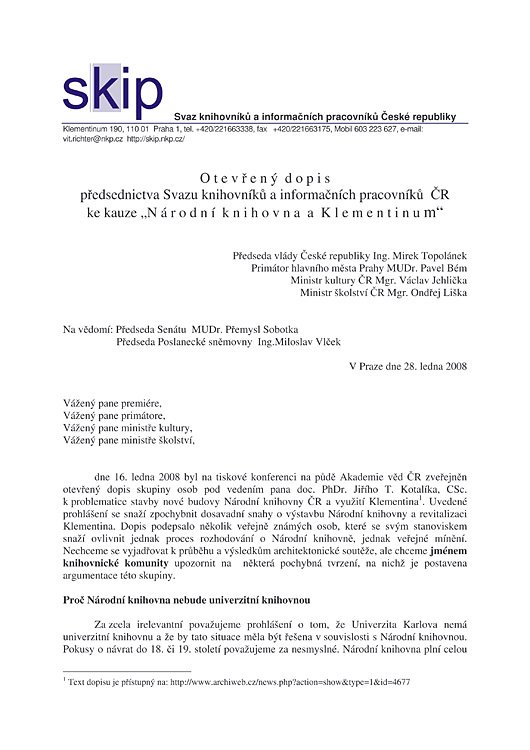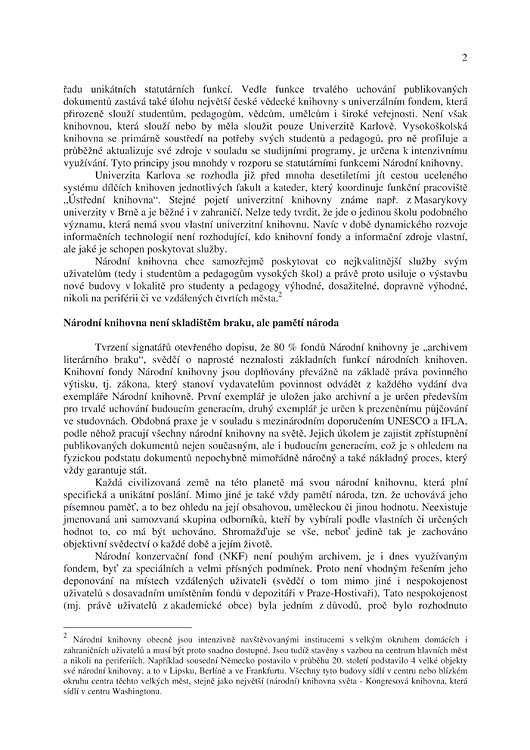
Open letter from the SKIP Presidium regarding the "NK and Klementinum" case
Source
Svaz knihovníků a informačních pracovníků České republiky
Svaz knihovníků a informačních pracovníků České republiky
Publisher
Jiří Horský
01.09.2008 00:10
Jiří Horský
01.09.2008 00:10
Open Letter
Presidency of the Czech Library and Information Association
Regarding the case "National Library and Klementinum"
Prime Minister of the Czech Republic Ing. Mirek Topolánek
Mayor of the Capital City of Prague MUDr. Pavel Bém
Minister of Culture of the Czech Republic Mgr. Václav Jehlička
Minister of Education of the Czech Republic Mgr. Ondřej Liška
Mayor of the Capital City of Prague MUDr. Pavel Bém
Minister of Culture of the Czech Republic Mgr. Václav Jehlička
Minister of Education of the Czech Republic Mgr. Ondřej Liška
For your information: President of the Senate MUDr. Přemysl Sobotka
Speaker of the Chamber of Deputies Ing. Miloslav Vlček
In Prague on January 28, 2008
Dear Prime Minister,
Dear Mayor,
Dear Minister of Culture,
Dear Minister of Education,
On January 16, 2008, an open letter was published at a press conference at the Czech Academy of Sciences led by Mr. doc. PhDr. Jiří T. Kotalík, CSc. concerning the construction of a new building for the National Library of the Czech Republic and the use of Klementinum. The stated declaration attempts to call into question the ongoing efforts to construct the National Library and revitalize Klementinum. The letter was signed by several publicly known figures who aim to influence both the decision-making process regarding the National Library and public opinion with their position. We do not want to comment on the course and results of the architectural competition, but we want to draw attention on behalf of the library community to certain questionable claims upon which this group's arguments are based.
Why the National Library Will Not Be a University Library
We consider the statement that Charles University does not have a university library and that this situation should be resolved in relation to the National Library to be completely irrelevant. Attempts to revert back to the 18th or 19th century are seen as nonsensical. The National Library performs a number of unique statutory functions. In addition to the function of permanent preservation of published documents, it also serves as the largest Czech scientific library with a universal collection that naturally serves students, teachers, researchers, artists, and the general public. However, it is not a library that serves or should serve only Charles University. University libraries primarily focus on the needs of their students and teachers, profiling and continuously updating their resources in accordance with study programs; they are intended for intensive use. These principles are often in conflict with the statutory functions of the National Library.Charles University decided many decades ago to adopt a comprehensive system of individual libraries of its faculties and departments, coordinated by a functioning establishment called the "Central Library". We are familiar with the same concept of a university library from Masaryk University in Brno and it is common abroad as well. Therefore, it cannot be claimed that it is the only school of similar importance that does not have its own university library. Moreover, in times of rapid development of information technology, it is not decisive who owns library collections and information resources, but what services they are able to provide.
The National Library certainly wants to provide the highest quality services to its users (including students and teachers of universities) and that is precisely why it is striving for the construction of a new building in a location that is advantageous, accessible, and well-connected for students and teachers, not on the periphery or in distant neighborhoods of the city.
The National Library Is Not a Warehouse of Junk, But the Memory of a Nation
The statement of the signatories of the open letter, that 80% of the National Library's collections are an "archive of literary junk," shows a complete ignorance of the basic functions of national libraries. The collections of the National Library are primarily supplemented based on the law of mandatory deposit, which stipulates publishers' obligation to submit two copies of each publication to the National Library. The first copy is archived and is intended primarily for permanent preservation for future generations; the second copy is designated for on-site borrowing in reading rooms. Similar practices are in line with international recommendations from UNESCO and IFLA, which govern how all national libraries in the world operate. Their task is to ensure access to published documents not only for current but also for future generations, which, considering the physical nature of documents, is undoubtedly an extraordinarily demanding and costly process, guaranteed by the state.Every civilized country on this planet has its national library that fulfills specific and unique missions. Among other things, it is always the memory of the nation, meaning it preserves its written memory, regardless of its content, artistic, or other value. There is no appointed or self-appointed group of experts who would select what should be preserved based on their own or designated values. Everything is collected, as only then can an objective witness to every time and its life be preserved.
The National Conservation Fund (NKF) is not just an archive; it is also a currently utilized collection, albeit under special and very strict conditions. Therefore, it is not a suitable solution to deposit it in locations distant from users (this is also evidenced by the dissatisfaction of users with the current placement of collections in the depository in Prague-Hostivař). This dissatisfaction (among others, particularly from users in the academic community) was one of the reasons why it was decided to integrate NKF into the spaces of the new building. National libraries in democratic countries do not censor or assess the "quality" of collections, but serve the role of memory, which is primarily important when documents are not accessible in other libraries, such as university libraries.
The Future of the National Library Cannot Be Founded Solely on the Revitalization of Klementinum
The preparation of a new building is not being addressed separately from the revitalization of Klementinum; on the contrary, one cannot practically exist without the other. The planned reconstruction should not lower the high level of its artistic quality but should free Klementinum from the layers of insensitive interventions from previous years and return its original baroque charm. There are also plans for Klementinum to be used for Charles University.The baroque complex of Klementinum is not suitable for operating the National Library as a whole in the long term. This has been confirmed by both the analysis of current and future needs and the opinions of experts in the past and present. The fact that the State Technical Library will be relocated does not change anything. It occupies about one-sixth of the premises at Klementinum and has a storage capacity of about 600,000 volumes, which represents the National Library's acquisition over 6 to 7 years. Currently, about 2.5 million volumes are stored in Klementinum, and 4 million volumes in the depository in Hostivař, while the average annual acquisition is around 80,000 - 100,000 volumes. The proportion of books that can be accessed within hours is continually decreasing in favor of books stored outside Klementinum, which are accessible within days. This negative trend has been long deteriorating the services for users, who point to this unfavorable situation. The National Library has nearly 40,000 registered users, records around 600,000 visitors annually, and makes over half a million loans.
The National Library wants to ensure prompt and quality services for its users while simultaneously creating conditions for its collections to be utilized by future generations. This cannot be achieved in Klementinum without radical changes to the essence of this national cultural monument. The architect Ladislav Machoň, who is acclaimed today, dealt with the reconstruction of Klementinum for the needs of the library radically in the first half of the 20th century: he completely demolished ceilings in parts of the building, filled basements, destroyed baroque trusses, and replaced them with concrete structures, and where necessary, completed Klementinum. This reconstruction, which ruthlessly destroyed a significant part of the original baroque structure, may please some, but contemporary conservationists would certainly not understand it. If the future of the library were to be secured in Klementinum, much more significant interventions in the historical building than those so far would have to occur, especially because expansion into the underground is not possible. That is precisely why it was decided to construct a new building, with the understanding that predominantly historical library collections would remain at Klementinum, limited in scope and whose operation does not require radical interventions in the building.
A Building for the National Library Is a Debt of the State to the Czech Nation
Throughout its existence, the Czech state has been unable to build a building for its National Library. The building for the National Theater was constructed with the help of a nationwide collection, the National Museum building with the assistance of patrons and revivalists, space was provided for the National Gallery and other institutions of national significance. In the future, it will undoubtedly build a National Football Stadium and perhaps even host the Olympic Games. However, we have serious concerns that the National Library will again not be built, thus exposing the "memory of the nation" to another approaching crisis with immeasurable consequences. The situation is repeated periodically, and it is always politicians who shield themselves with public interests but sadly decide against the National Library.We regret to state that no significant political figure has yet emerged in the Czech Republic who would take the construction of the new National Library as their own and understand it as a fundamental priority of their political career, as it is in other European countries.
We therefore urgently ask you, dear sirs, to use your full weight to ensure that the new building is constructed in the shortest possible timeframe.
On behalf of the presidency of the Czech Library and Information Association
PhDr. Vít Richter - chairman
Mgr. Zlata Housková - secretary
PhDr. Jarmila Burgetová - honorary chairwoman
The English translation is powered by AI tool. Switch to Czech to view the original text source.
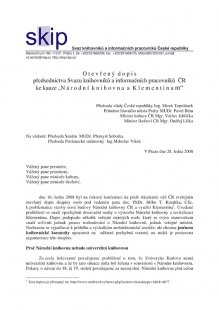
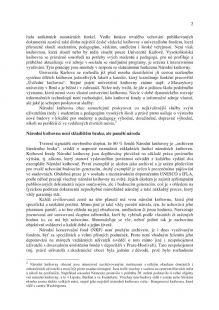
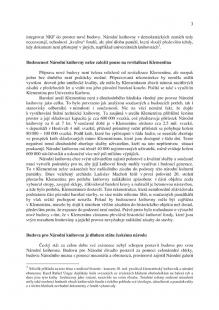
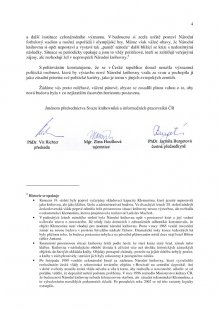
0 comments
add comment















